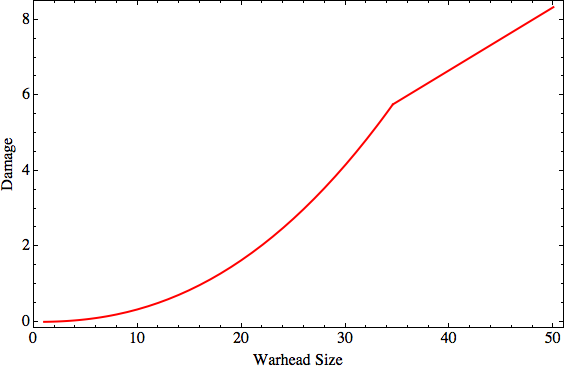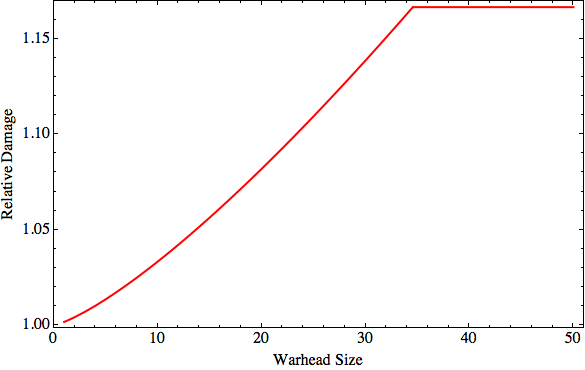Aurora is on version 2.5.0 C#, available at the Aurora Forums.
Contact Erik on the forum for a wiki account.
Difference between revisions of "Shock Damage"
| Line 4: | Line 4: | ||
When a large amount of damage is taken from a single missile or energy weapon impact, extra "shock damage" may be applied directly to ship internal components. The amount of shock damage inflicted is roughly proportional to the damage from the main blast. Note that shock damage does not get applied if the main hit is absorbed by [[Shields]], regardless of the strength of the hit. | When a large amount of damage is taken from a single missile or energy weapon impact, extra "shock damage" may be applied directly to ship internal components. The amount of shock damage inflicted is roughly proportional to the damage from the main blast. Note that shock damage does not get applied if the main hit is absorbed by [[Shields]], regardless of the strength of the hit. | ||
| + | ;Shock Damage in C# Aurora will operate as follows: | ||
| + | |||
| + | # The chance of shock damage is equal to: Damage Caused to armour / Size of Ship in HS. For example a 9 point warhead vs a 6000 ton ship has a 7.5% chance of shock damage. A 16 point energy impact vs 10,000 ton ship has * an 8% chance of shock damage. | ||
| + | # Any damage with less than a 5% chance is ignored as too small (i.e. any damage where the strength is less than 5% of the ship HS) | ||
| + | # If shock damage occurs, the shock damage is rolled randomly up to 20% of armour damage | ||
| + | Where the armour damage is easily divisible by 5, for example a 15 point warhead, there is a random roll from 1 to max shock damage (1-3 in this case). Where the armour damage is not divisible by 5, the max shock damage is the amount divisible by 5 (rounded) down plus a percentage chance of an extra 1 max shock damage equal to the percentage of 5 remaining. For example, a 12 point warhead would be assigned 2 max shock damage approximately 60% of the time and 3 max shock damage 40% of the time. | ||
| + | |||
| + | [//http://aurora2.pentarch.org/index.php?topic=8495.msg111676#msg111676 Date 30.12.2018] | ||
| + | |||
| + | ;Shock Damage pre-C# Aurora operated as follows: | ||
* Chance to inflict shock damage: <code> Damage^1.3 %</code> | * Chance to inflict shock damage: <code> Damage^1.3 %</code> | ||
* Amount of Shock Damage inflicted: <code>(Damage/3)*Random Percentage</code> | * Amount of Shock Damage inflicted: <code>(Damage/3)*Random Percentage</code> | ||
{| class="wikitable collapsible collapsed" width="100%" | {| class="wikitable collapsible collapsed" width="100%" | ||
| − | !Graphic: The effect of warhead/beam size on damage | + | !Graphic: The effect of warhead/beam size on damage in VB (pre-C# version) |
|- | |- | ||
|This graph shows the average shock damage inflicted depending on warhead/beam size respectively: | |This graph shows the average shock damage inflicted depending on warhead/beam size respectively: | ||
| Line 20: | Line 30: | ||
;Offensive Considerations | ;Offensive Considerations | ||
| − | Shock Damage can | + | Shock Damage can be decisive, able to potentially cripple key systems early in an engagement. To use it, large missiles and beam weapons are necessary. [[Lasers|Spinal Laser Weapons]] are especially suited to deliver a large punch. |
;Defensive Considerations | ;Defensive Considerations | ||
Revision as of 05:57, 16 October 2022
Shock Damage is a type of internal damage that can occur as a result of weapon impact with the ship's hull armor. As a result it is possible for a ship to lose a key system even when its armor has not been penetrated. This is more likely to occur with larger energy weapons and missile warheads hit.
Overview
When a large amount of damage is taken from a single missile or energy weapon impact, extra "shock damage" may be applied directly to ship internal components. The amount of shock damage inflicted is roughly proportional to the damage from the main blast. Note that shock damage does not get applied if the main hit is absorbed by Shields, regardless of the strength of the hit.
- Shock Damage in C# Aurora will operate as follows
- The chance of shock damage is equal to: Damage Caused to armour / Size of Ship in HS. For example a 9 point warhead vs a 6000 ton ship has a 7.5% chance of shock damage. A 16 point energy impact vs 10,000 ton ship has * an 8% chance of shock damage.
- Any damage with less than a 5% chance is ignored as too small (i.e. any damage where the strength is less than 5% of the ship HS)
- If shock damage occurs, the shock damage is rolled randomly up to 20% of armour damage
Where the armour damage is easily divisible by 5, for example a 15 point warhead, there is a random roll from 1 to max shock damage (1-3 in this case). Where the armour damage is not divisible by 5, the max shock damage is the amount divisible by 5 (rounded) down plus a percentage chance of an extra 1 max shock damage equal to the percentage of 5 remaining. For example, a 12 point warhead would be assigned 2 max shock damage approximately 60% of the time and 3 max shock damage 40% of the time.
- Shock Damage pre-C# Aurora operated as follows
- Chance to inflict shock damage:
Damage^1.3 % - Amount of Shock Damage inflicted:
(Damage/3)*Random Percentage
Strategy
- Offensive Considerations
Shock Damage can be decisive, able to potentially cripple key systems early in an engagement. To use it, large missiles and beam weapons are necessary. Spinal Laser Weapons are especially suited to deliver a large punch.
- Defensive Considerations
Against large missiles, active defenses are best used to prevent Shock Damage. Shields are a valuable defense for blunting Shock Damage, as large beam weapons have a slower RoF, allowing for recharge. Damage Controls can fix critical systems and bring them back online. Redundancy in Sensors and Fire Control, Fuel Tanks and Engines can prevent a ship becoming useless by a single lucky hit.
Notes
- This feature was added in Version 6.30.

